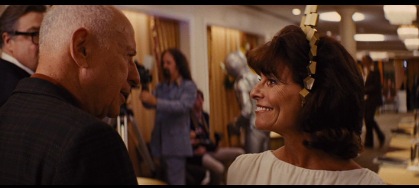We are never going to come to the end of Catwomen. For one thing, Anne Hathaway remains too young for the column, and she’s older than Zoë Kravitz. At least a dozen women have played the role in animation or live action, and that number is only going to keep getting larger as we go, as each incarnation of Batman only really feels complete when there’s a Catwoman to serve as his foil. Say what you want about the Joker—and we’ve covered multiple talented actors who took up that mantle—it is in many ways Catwoman who is the ultimate necessity to complete Gotham. And while Adrienne Barbeau is not who I picture when I picture the character, she’s still one of the best to wield the whip.
In the ‘70s, far from thinking of her as an actress who brought a snarky independence to a long-running character who could be just a joke, she was pretty much thought of as a walking pair of breasts. Joe Bob Briggs apparently refers to “the two enormous talents on that woman” in his review of The Fog. Then-husband John Carpenter apparently had to be the one to break it to her that she was cast in Battle of the Network Stars because they wanted to watch her jiggle as she ran. It’s no wonder she’s referred to Hollywood as a meat market, given how little interest the industry generally had in her talent.
Despite that, it’s always been clear she was talented. She was, back in the ‘60s, in one of those musicals that basically seemed to exist as a reason to have naked people wandering the stage, and in a negative review of it, she herself was praised. When people bothered to pay attention, which they didn’t always do, they noticed that she was really good at what she did. She was nominated for a Tony as the original Broadway Rizzo in Grease, after all, and that’s a few years before her Battle of the Network Stars era.
In part it was her marriage to John Carpenter that helped her expand her reputation. He cast her in his movies because that’s a John Carpenter sort of thing to do, I think—from what I know of him, he seems a fan of “work with the people you like,” and if you don’t like your wife, that’s a bad sign. She has been somewhat typecast as a beautiful, feisty woman, and it’s true that Catwoman is just another aspect of that, but at least she was allowed enough personality to be feisty. I also feel as though the amount of times only her voice has appeared are something of a response to the times her body was highlighted.
I am also pleased to report that she and Bea Arthur remained good friends until Arthur’s death. Arthur took Barbeau under her wing and was kind to her, and that’s good to know. She also seems to have remained on decent terms with Carpenter, though I know less about that. The meat market grinds on, goodness knows, but Barbeau survives. She’s made an album of folk music, she’s written her autobiography, and she continues to perform on the stage. Is it exhausting that IMDb mentions, as one of her trademarks, her “enormous breasts”? So exhausting. Let’s talk instead about her enormous talent and enormous survival skills.
Don’t make me turn to a life of crime; consider supporting my Patreon or Ko-fi!

